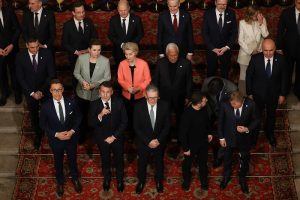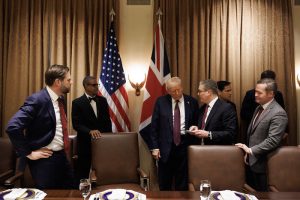PNN – US President Donald Trump’s controversial decision to impose heavy tariffs on goods imported from Europe has not only threatened the fragile economy of the Green Continent with a deeper recession, but also, for the first time in eight decades, has forced European leaders to view their long-standing partner across the Atlantic not as a strategic ally, but as a serious threat to the continent’s economic and security stability.
According to the report of Pakistan News Network, transatlantic relations have faced an unprecedented crisis following the escalating policies of US President Donald Trump, which has put Europe under heavy pressure in two vital economic and security aspects. Washington’s imposition of heavy trade tariffs against European allies has brought the continent’s economy to the brink of a severe recession and has prompted unprecedented reactions from European economic powers.
Meanwhile, Trump’s recent positions on reducing US defense commitments within the NATO framework have raised deep concerns about the credibility and durability of Washington’s security umbrella on the Green Continent, prompting European countries to strive for an unprecedented increase in military spending and strengthening their independent defense capabilities.
Read more:
Pakistan in the process of sending a delegation to the US with Trump’s tariff agenda
Trade war and pressure on the European economy
Taking an aggressive approach to international trade, Donald Trump has imposed a series of sweeping tariffs on many countries around the world, including close US allies in Europe. Accusing Europe of “plundering” and “exploiting” the US economy, he announced a base tariff of 10% on all imports to the US, with much higher tariffs on some partners. In response, the Trump administration imposed an unprecedented 20 percent tariff on goods imported from the European Union, the highest in a century, observers say. The move, part of what Trump called a day of free trade, quickly rattled stock markets and sent shockwaves through the global economy.
The European Union, America’s largest trading partner, has been hit hard by the trade war, with European countries concerned that the tariffs will slow their economic growth and threaten thousands of jobs. French President Emmanuel Macron has sharply criticized Trump’s tariffs, calling them “brutal and unfounded” and warning that the French and European response to them will be strong and go beyond past retaliations. He stressed that the trade war will ultimately make the US economy “poorer and weaker.”

The French prime minister also called the new tariffs “a disaster for the United States and its people” and acknowledged that the situation would also be “very difficult” for Europe. At the EU level, European Commission President Ursula von der Leyen said the 27-member bloc was ready to take countermeasures if talks with Washington failed. He warned that Trump’s decision to impose sweeping tariffs on the entire world, including Europe, would be a “major blow to the global economy” that could have dire consequences for millions of people around the world. In general, European leaders have stressed a united response by condemning Trump’s trade policies and calling for coordinated action against Washington.
Meanwhile, the European Union has filed a complaint with the World Trade Organization and prepared a list of American goods for retaliatory tariffs. Brussels’ statements called the American tariffs “unilateral and unjustified” and emphasized the need to defend Europe’s trade interests. As Europe’s largest economy, Germany, in addition to accompanying the EU’s retaliatory measures, is considering diversifying its trading partners. The German economy minister announced: “There is an opportunity to create new trade alliances that we must use decisively.”
German Chancellor Olaf Schulz also emphasized that Europe will give a “united, strong and proportionate” response to the United States, and considers the power of the Union’s common market of 450 million people as leverage to prevent a full-scale trade war. He stated: The European Union, through this integrated market, has high bargaining power in negotiations with Washington and should use this leverage to protect its interests. This German approach reflects Europe’s desire to form alternative economic alliances in the global arena and reduce vulnerability to unpredictable US trade policies.

Meanwhile, some British political figures have called for a more decisive response alongside Europe. Among them, Ed Davey, leader of the Liberal Democrats and opposition leader, called on Starmer to lead a “coalition of willing countries” to stand up to Trump’s trade war. Although the British government has rejected this proposal and considered it equivalent to a choice between America and Europe, the raising of such ideas indicates the concern of London’s political circles about the consequences of inaction in the face of Washington’s actions. Overall, in the economic dimension, Britain is trying to reduce the damage caused through direct negotiations and at the same time refrain from fully aligning itself with the United States, although according to polls, public opinion in the country is about 71% in favor of imposing reciprocal tariffs against the United States.
Weakening the Western defense umbrella and increasing European military spending
Trump’s policies are not limited to the economy, but have also shaken the foundations of Western collective security. Since the beginning of his presidency, Trump has shown a cold approach to US security commitments in Europe. He has repeatedly called NATO “obsolete” or complained that the United States bears an unfair share of the burden of providing security for Europe. Trump has openly pressured European NATO members to sharply increase their defense spending, raising their military budgets to 2 percent or even 5 percent of GDP.
European leaders are now facing the possibility of a reduced presence or even a US withdrawal from NATO as a real scenario. Reports suggest that the White House’s inclination towards isolationist approaches has forced European officials to reconsider their strategic priorities. A European analyst warns that any major US withdrawal from NATO could create a dangerous security vacuum that could empower adversaries and destabilize Europe. An example of this concern was expressed by Emmanuel Macron, who in a controversial interview likened the current state of NATO to “brain death” and said that Europe could no longer rely entirely on the US for its defense.

Increasing defense budgets and the military independence plan
In response to the reduced likelihood of unconditional American support, European countries have taken practical steps to strengthen their military capabilities. Former German Chancellor Angela Merkel, early in the first months of Trump’s presidency, made it clear that Europe could no longer “rely entirely on others” and must “take its destiny into its own hands.” These statements, made after Merkel’s less than successful meetings with Trump at the G7 and NATO forums in 2017, signaled a shift in attitude in Europe: relying solely on America is not enough.
Since then, most European countries have gradually increased their military budgets. Former NATO Secretary General Jens Stoltenberg announced in 2019 that defense investment by European members and Canada has been increasing in response to US demands, adding more than $100 billion to NATO defense spending in recent years. This trend accelerated, especially under direct pressure from Trump, with almost all European NATO members presenting plans to reach a 2% share of GDP in their defense budget by 2024. However, Washington’s demands have gone further, with Vice President Trump even calling on Europe to move towards allocating 5% of GDP to defense at the Munich Security Conference (2025). Such a demand is far removed from Europe’s economic realities.

Implications for the International Order: American Isolation and European Strategic Independence
The transatlantic rift is not just a passing disagreement between Washington and European capitals, but could have profound implications for the future international order. After decades of being a key pillar of a rules-based, cooperative global order, the strong US-European alliance is now faltering.
Analysts believe that the Trump administration’s unilateral and sometimes contemptuous approach towards Europe is a structural change in US foreign policy, not just a temporary behavior. This perception has led Europe to conclude that even with a possible change of government in Washington; it will not be possible to quickly return to the previous situation because a gap of distrust has been created. If this rift is not repaired, America could find itself without the support of its closest friends and become more isolated. Indeed, continuing this trend could lead to the weakening of the Western front, which has claimed the liberal international order for the past seventy years.
On the other hand, Europe has learned its lessons from this era and has begun to move towards self-reliance. For Europeans, strategic autonomy is no longer a theoretical or ambitious discussion, but a practical necessity. The concept of “strategic autonomy”, which was previously mostly discussed in academic circles, has now found its place in official EU documents and has become an explicit statement by officials.

